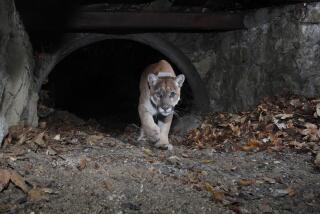A New Star for ‘Crouching Tiger’
- Share via
What sounds sweeter and more personal than a violin? Many people would say the erhu, a Chinese string instrument dating to the mid-8th century that has been put to some very modern uses recently.
Composer Tan Dun had the instrument in mind when writing music for Ang Lee’s Academy Award-winning film, “Crouching Tiger, Hidden Dragon.” But the sound he imagined didn’t make it to the screen. It was transposed for a cello so that Yo-Yo Ma could play the part.
Now comes the fuller realization of his original intention as he conducts the world premiere performances of the “Crouching Tiger” Concerto today through Sunday at the Irvine Barclay Theatre.
Karen Hwa-Chee Han will be the soloist.
“The sound [of the erhu] is like a woman’s voice,” Han said in a recent phone interview from her home in West Los Angeles. “It’s just like talking, like a friend talks.”
The instrument has two steel (originally silk) strings and tuned a fifth apart. They run from the top of the neck to a resonating box made of snakeskin (most often python). There is no fingerboard.
Unlike a violin, the instrument is played vertically, like a cello, as it rests on the musician’s thigh. The bow, originally made of bamboo, is horsehair and cannot be removed from between the strings.
“When you play the outer string, you use one technique,” Han said. “When you play the inner string, you use a different technique. Normally, we can only play one string at a time because they are so far apart.
“We cannot play two notes together, although I will try for this piece.” Several bars call for two strings sounding simultaneously as a special effect. Dun has written a demanding piece for the instrument because he knows its capabilities. He and Han studied at about the same time at the Central Conservatory of Music in Beijing.
“I was in the middle school. He was in the college,” she said. “He knows how to play erhu. He knows the technique and the style. His piece gives me lots of challenges, which I love.”
Han was born in a small town in the Anhui province of China. Her father played the instrument and, believing that an instrumentalist had a longer professional life in music than a singer, insisted that she learn it too. He forced her to practice.
“In the beginning, I was mad. It upset me,” she said. “I had to practice hard, every day, two to three hours.”
At the age of 10, she was sent to study at the Central Conservatory.
“Once I got into the professional school, I started to appreciate these things. I was getting older and more mature. My instrument became one of my friends. If I couldn’t speak out, I could use my instrument to express my feelings.”
At times, she practiced eight hours a day. “My hands hurt. Sometimes they got bloody. But if you want something, really badly, you want to practice.”
Sometimes that meant sneaking in a few hours practice after 11 p.m. when the school had turned off the electricity.
“I would just light a candle and practice until 1 or 2 o’clock in the morning. Now I love the music, I love the stage, I love performance.”
But about the time she was falling in love with traditional music, China was falling out of love with it.
She was in graduate school when China was just opening up to the West, she said. Pop music and rock ‘n’ roll were everywhere, and there was less interest in Chinese music.
“I felt quite hurt. Things I worked so hard to learn weren’t being appreciated anymore. But I did get to visit the United States in 1985 on a government-sponsored music tour of 15 cities. That gave me a very good impression that American people would appreciate my music.”
She moved to Hollywood in 1988, making it her home and working in films and television and on recording projects involving collaborations with jazz artists and other musicians. She has not returned to China.
“Western people are very open, accepting me as one of their own family,” she said. “That makes me feel very encouraged and also very happy. The world is becoming closer.”
*
Karen Hwa-Chee Han will play the first performances of Tan Dun’s “Crouching Tiger, Hidden Dragon” Concerto for Erhu and Orchestra today and Saturday at 8 p.m. and Sunday at 3 p.m. at the Irvine Barclay Theatre, 4242 Campus Drive. Dun will conduct. The program also will include the West Coast premiere of his “Concerto for Water Percussion and Orchestra” with soloist David Cossin. $33 to $38. (949) 854-4646.
More to Read
The biggest entertainment stories
Get our big stories about Hollywood, film, television, music, arts, culture and more right in your inbox as soon as they publish.
You may occasionally receive promotional content from the Los Angeles Times.










